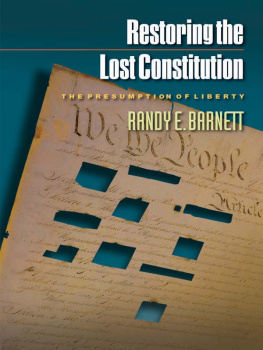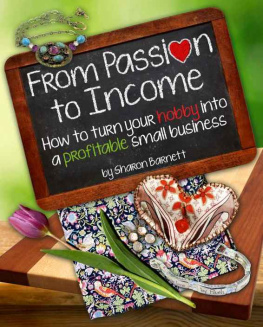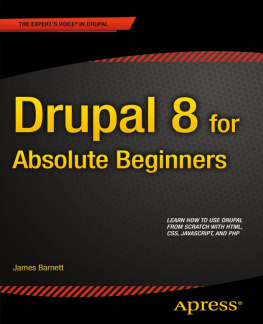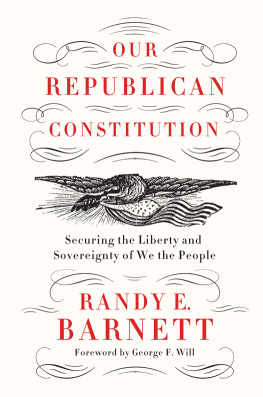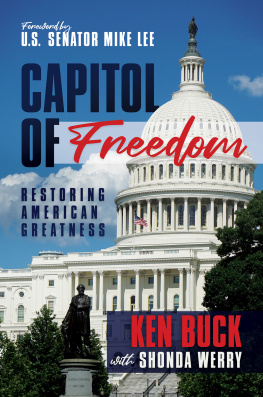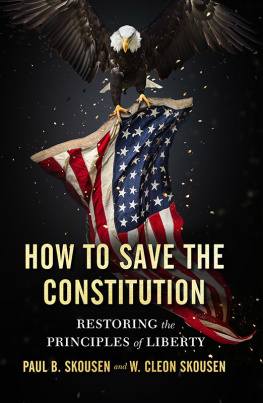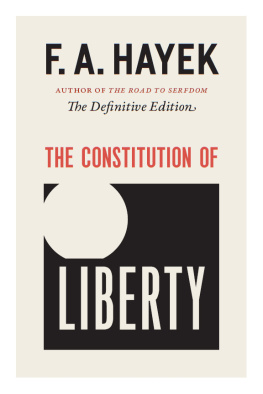Barnett - Restoring the lost constitution: the presumption of liberty
Here you can read online Barnett - Restoring the lost constitution: the presumption of liberty full text of the book (entire story) in english for free. Download pdf and epub, get meaning, cover and reviews about this ebook. City: Princeton;New Jersey;United States, year: 2014;2012, publisher: Princeton University Press, genre: Politics. Description of the work, (preface) as well as reviews are available. Best literature library LitArk.com created for fans of good reading and offers a wide selection of genres:
Romance novel
Science fiction
Adventure
Detective
Science
History
Home and family
Prose
Art
Politics
Computer
Non-fiction
Religion
Business
Children
Humor
Choose a favorite category and find really read worthwhile books. Enjoy immersion in the world of imagination, feel the emotions of the characters or learn something new for yourself, make an fascinating discovery.
Restoring the lost constitution: the presumption of liberty: summary, description and annotation
We offer to read an annotation, description, summary or preface (depends on what the author of the book "Restoring the lost constitution: the presumption of liberty" wrote himself). If you haven't found the necessary information about the book — write in the comments, we will try to find it.
Restoring the lost constitution: the presumption of liberty — read online for free the complete book (whole text) full work
Below is the text of the book, divided by pages. System saving the place of the last page read, allows you to conveniently read the book "Restoring the lost constitution: the presumption of liberty" online for free, without having to search again every time where you left off. Put a bookmark, and you can go to the page where you finished reading at any time.
Font size:
Interval:
Bookmark:

Restoring the Lost Constitution
Restoring the Lost Constitution
THE PRESUMPTION OF LIBERTY
Randy E. Barnett
PRINCETON UNIVERSITY PRESS
PRINCETON AND OXFORD
Copyright 2004 by Princeton University
Press Published by Princeton University Press, 41 William Street, Princeton, New Jersey 08540
In the United Kingdom: Princeton University Press, 3 Market Place, Woodstock, Oxfordshire OX20 1SY
All Rights Reserved
Third printing, and first paperback printing, 2005
Paperback ISBN-13: 978-0-691-12376-9
Paperback ISBN-10: 0-691-12376-4
The Library of Congress has cataloged the cloth edition of this book as follows
Barnett, Randy E.
Restoring the lost constitution : the presumption of liberty / Randy E. Barnett.
p. cm.
Includes bibliographical references and index.
ISBN 0-691-11585-0 (cloth : acid-free paper)
1. Constitutional historyUnited States. 2. Constitutional lawUnited States. 3. Judicial reviewUnited States. 4. United States. Supreme Court. I.
KF4541 .B313 2004
342.73'029dc21 2003044205
British Library Cataloging-in-Publication Data is available
This book has been composed in Sabon
Printed on acid-free paper.
pup.princeton.edu
Printed in the United States of America
10 9 8 7 6 5 4 3
INTRODUCTION
Why Care What the Constitution Says?
CHAPTER ONE
The Fiction of We the People: Is the Constitution Binding on Us?
CHAPTER TWO
Constitutional Legitimacy without Consent: Protecting the Rights Retained by the People
CHAPTER THREE
Natural Rights as Liberty Rights: Retained Rights, Privileges, or Immunities
CHAPTER FOUR
Constitutional Interpretation: An Originalism for Nonoriginalists
CHAPTER FIVE
Constitutional Construction: Supplementing Original Meaning
CHAPTER SIX
Judicial Review: The Meaning of the Judicial Power
CHAPTER SEVEN
Judicial Review of Federal Laws: The Meaning of the Necessary and Proper Clause
CHAPTER EIGHT
Judicial Review of State Laws: The Meaning of the Privileges or Immunities Clause
CHAPTER NINE
The Mandate of the Ninth Amendment: Why Footnote Four Is Wrong
CHAPTER TEN
The Presumption of Liberty: Protecting Rights without Listing Them
CHAPTER ELEVEN
The Proper Scope of Federal Power: The Meaning of the Commerce Clause
CHAPTER TWELVE
The Proper Scope of State Power: Construing the Police Power
CHAPTER THIRTEEN
Showing Necessity: Judicial Doctrines and Application to Cases
CONCLUSION
Restoring the Lost Constitution
GROWING UP, I was like most Americans in my reverence for the Constitution. Not until college was the first seed of doubt planted in the form of an essay by a nineteenth-century abolitionist and radical named Lysander Spooner. In his best-known work, No Treason: The Constitution of No Authority (1870), Spooner argued that the Constitution of the United States was illegitimate because it was not and could never have been consented to by the people on whom it is imposed. Although as an undergraduate I found Spooners argument unanswerable (and I must admit so it remained until I was in my forties), the problem was largely theoretical. My mind may have doubted, but my faith remained.
Until I took Constitutional Law at Harvard Law School. The experience was completely disillusioning, but not because of the professor, Laurence Tribe, who was an engaging and open-minded teacher. No, what disillusioned me was reading the opinions of the U.S. Supreme Court. Throughout the semester, as we covered one constitutional clause after another, passages that sounded great to me were drained by the Court of their obviously power-constraining meanings. First was the Necessary and Proper Clause in McCulloch v. Maryland (1819), then the Commerce Clause (a bit) in Gibbons v. Ogden (1824), then the Privileges or Immunities Clause of the Fourteenth Amendment in The Slaughter-House Cases (1873), then the Commerce Clause (this time in earnest) in Wickard v. Filburn (1942), and the Ninth Amendment in United Public Workers v. Mitchell (1947).
Nor were these landmark decisions isolated cases. In countless other opinions, the Supreme Court justices affirmed they meant it when they said the Constitution did not mean what it apparently said. According to the Supreme Court, a majority in Congress could restrict the liberties of the people pretty much any way it wished unless a law violated an express prohibition of the Constitutionor some privileged but unenumerated right such as the right of privacy. Even an express right, such as the right to keep and bear arms, could effectively be read out of the Constitution when the Supreme Court disapproved. Were this not enough, the most famous decision in which the Supreme Court had once tried holding the line, Lochner v. New York (1905), was taught along with other cases from the Progressive Era precisely as examples of how courts were not supposed to act. That Lochner is among the worst decisions the Supreme Court ever made was the received and unquestioned wisdom then, and largely remains so to this day on both the left and right of the political spectrum.
By the time I was finished with Constitutional Law, I was finished with the Constitution as well. The idea of protecting liberty by imposing written constraints on the government was an experiment that obviously had failed. When Spooners argument on legitimacy was combined with the practice of the Supreme Court, there was nothing left to take seriously. When I became a law professor and needed to decide what to write about or teach, I chose contracts, where courts seemed to take both written law and writings in general more seriously. Constitutional law was last on my list and I avoided it successfully for many years.
Then Brian Brille, at the time a law student at Stanford Law School, invited me to speak at the Fifth Annual National Student Symposium of the Federalist Society to be held there in the winter of 1986. The Federalist Society had been founded, after I had graduated, by students at several law schools who had been disillusioned in their own way by their law school experience. Their means of fighting back was to form a student organization where they could meet and support each other. They would also invite dissenting speakers to their campuses to challenge the conventional wisdom of their professors and they would gather once a year to hear their champions debate the best of the opposition, the sort of intellectual discourse so sorely missing at their home schools.
The topic of the symposium was the First Amendment and I was asked to participate on a panel on freedom of association. It was a distinguished group of speakers and, as a relatively unknown contracts professor, I sorely wanted to accept. Nevertheless, I declined. Brian, I said, I would really like to participate but you know what I think about the Constitution. I just do not do constitutional law (or words to this effect). Oh, come on, he replied. You only need to talk for ten minutes. You can come up with ten minutes of something to say (or words to that effect). Against my better judgment, I agreed.
As I painfully wrote my comments on freedom of association, I got to the part of the speech where I anticipated what I was sure would be the overwhelming sentiment of what I wrongly thought was a monolithically conservative group: the First Amendment specifies the right of freedom of speech, freedom of assembly and petition, and the free exercise of religion. It says nothing explicit about a freedom of association. I know what youre thinking, I wrote, mimicking Dirty Harry, what gives unelected lifetime appointed federal judges the power to protect a right not mentioned in the Constitution? In my speech, my answer was to read the text of the Ninth Amendment: The enumeration in the Constitution of certain rights shall not be construed to deny or disparage others retained by the People.
Next pageFont size:
Interval:
Bookmark:
Similar books «Restoring the lost constitution: the presumption of liberty»
Look at similar books to Restoring the lost constitution: the presumption of liberty. We have selected literature similar in name and meaning in the hope of providing readers with more options to find new, interesting, not yet read works.
Discussion, reviews of the book Restoring the lost constitution: the presumption of liberty and just readers' own opinions. Leave your comments, write what you think about the work, its meaning or the main characters. Specify what exactly you liked and what you didn't like, and why you think so.

